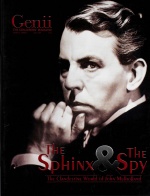Help us get to over 8,756 articles in 2024.
If you know of a magician not listed in MagicPedia, start a New Biography for them. Contact us at magicpediahelp@gmail.com
John Mulholland
| John Mulholland | |
 Cover of Genii - June 2013 | |
| Born | June 9, 1898 Chicago, Illinois |
|---|---|
| Died | February 25, 1970 (age 71) New York City, New York |
| Nationality | American |
| Categories | Books by John Mulholland |
John Mulholland (b.1898-d.1970) was born in Chicago, but moved to New York City when young with his mother. He started performing as a teenager, and went on to become a widely respected authority on magic.
Career in Magic
Mulholland was taught by John William Sargent. During his career, he performed in forty-two countries, authored ten books on magic, and performed at the White house eight times. His 90-minute stage show was carried in two suitcases. He also served as a consultant on conjuring for the Encyclopedia Britannica and the Merriam-Webster Dictionary. He was, at one time, the only magician listed in "Who's Who in America".
He also invented the "Mulholland Box" (a type of Okito coin box).
In the 1930s, he took over The Sphinx, the largest magic magazine at it's time, after the death of A. M. Wilson, and continued as the editor for 23 years. Mulholland stopped the Sphinx to become a consultant to the newly created CIA in 1953, although he told subscribers it was due to health reasons.
Mulholland's 1944 book The Art of Illusion: Magic for Men To Do was selected by the Council on Books in Wartime to be reprinted as an Armed Services Edition (a small paperback version distributed to U.S. military personnel). It is estimated that almost 100,000 copies of the Armed Services Edition were printed (in November 1944), making it probably the most popular magic book of World War Two, by quantity produced.
Career with U.S. Intelligence
Mulholland was recruited by Sidney Gottleib in 1953, for the top secret CIA project known as "MK-ULTRA". His assignments included working with billionaires and inventors, cracking codes and delving into the world of ESP research, experiments with the use of LSD, and writing a manual on deception for use in the Cold War.
He also wrote classified manuscripts for the CIA. Two that have since been de-classified are: "Some Operational Applications of the Art of Deception", and "Recognition Signals" in 1954. Mulholland continued to work for the CIA at least until 1958.
Death
Mulholland died in New York City on February 25, 1970 at age 71.
At the time of his death, Mulholland had one of the largest collections of magic memorabilia and apparatus (including almost all of Houdini's paper archival estate that had not been given to the Library of Congress) and a library of over 4,000 books. Following his death, illusionist David Copperfield purchased most of Mulholland's archival magic estate and library (including the entire Houdini archival collection and library owned by Mulholland) all of which is now housed in Copperfield's International Museum and Library of the Conjuring Arts in Las Vegas.
Books by
- Conjurer and Pedagogue (with Milton M. Smith 1924)
- Magic in the Making (with Milton M. Smith 1925)
- Behind the Magician's Curtain (1928)
- Quicker than the Eye (1932)
- The Magic and Magicians of the World (1932)
- Mulholland's Story of Magic (1935)
- Modern Magician: A Pocket Manual of Tricks (1937)
- Beware Familiar Spirits (1938)
- The Girl in the Cage (a novel with Cortland Fitzsimmons, 1939)
- Christmas Conjurer (ca. 1940)
- Magic in the Library (1943)
- The Art of Illusion: Magic for Men To Do (1944)
- Magic for Entertaining, The Early Magic Shows ( Reprint of "Art of Illusions" 1945)
- Practical Puppetry (1961)
- John Mulholland's Book of Magic (1963)
- Magic of the World (1965)
- The Magical Mind - Key to Successful Communications (with George Gordon 1967)
References
| This page incorporated content from John Mulholland (magician),
a page hosted on Wikipedia. Please consult the history of the original page to see a list of its authors. Therefor, this article is also available under the Creative Commons Attribution-ShareAlike License |
- Cover Genii 1937 October
- Cover Genii 1964 July
- Cover Genii 1965 November
- Broken Wand MUM May 1970
- Article Genii 2001 April: THE SPHINX AND THE SPY The Clandestine World of John Mulholland By Michael Edwards
- Article Genii 2003 August: Some Operational Applications of the Art of Deception
- The MagiCIAn: John Mulholland's Secret Life by Ben Robinson (2008)
- http://www.frankolsonproject.org/Articles/Mulholland.html
- The Official C.I.A. Manual of Trickery and Deception by Melton and Wallace (2009)
- http://en.wikipedia.org/wiki/Sidney_Gottlieb
- http://en.wikipedia.org/wiki/MKULTRA
- http://www.miraclefactory.net/mulhollandcontents.htm